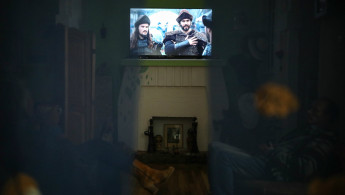Egypt tells Muslims to boycott Ertugrul and other Turkish dramas in bizarre anti-Erdogan fatwa
Turkish President Erdogan is trying to revive the Ottoman empire through the power of Turkish television series, the Global Fatwa Index said.
2 min read
Turkish TV has seen a boom in popularity across the world in recent years [Anadolu]
Egypt's highest Islamic authority has warned pious viewers against watching popular Turkish television series such as "Resurrection: Ertugrul" in a bizarre fatwa.
Turkish dramas have seen a global export boom in recent years with growing popularity not only in Muslim-majority countries but also in Latin America and Asia.
But Muslim viewers should stay away, the Global Fatwa Index said on Sunday.
Popular television series such as "Resurrection: Ertugrul" and "Valley of the Wolves" are part of efforts led by Turkish President Recep Tayyip Erdogan to revive the Ottoman Empire, it claimed.
The Global Fatwa Index is associated with Egypt's Dar al-Iftaa, one of the Muslim world's oldest and most influential bodies responsible for giving out fatwas, or religious edicts, on all aspects of worship and life.
Turkey has been a staunch rival of Egypt since President Abdel Fattah Al-Sisi seized power from the country's first democratically-elected president - and Turkish-ally - Mohammad Morsi in a 2013 coup.
The Index said that Erdogan and his supporters "export to the people and nations the idea that they are the leaders of the caliphate, responsible for supporting Muslims worldwide and being their salvation from oppression and injustice, while also seeking to implement Islamic law", according to Egyptian media.
"They hide the fact that their main drive in these colonial campaigns is what Erdogan reaps from material and political gains," it added.
It also claimed that the Turkish president would do anything to spread his power across the world, even using cultural or artistic products, hence the ban, the Index rationalised.
It is not only Egypt's leading Islamic religious authority that has accused Turkey of using its popular television shows to cultivate soft power, however.
Turkey's then Minister of Culture and Tourism Omer Celik said in 2014 that Turkey's wildly popular dramas played a powerful role in helping the country build ties across the region.
The idea has even been the topic of a number of academic papers.
As noted by the Global Fatwa Index, several of the country's most popular shows focus on its Ottoman heritage.
"Resurrection: Ertugrul" follows the story of Ertugrul, the father of Ottoman dynasty founder Osman. The series has been dubbed by some as the Turkish "Game of Thrones".
Other historical blockbusters include "Magnificent Century" - which focuses on the life of Ottoman Sultan Suleyman and his wife - and Netflix docuseries "Rise of Empires: Ottoman", which tells the story of the fall of Constantinople.
Follow us on Facebook, Twitter and Instagram to stay connected
Turkish dramas have seen a global export boom in recent years with growing popularity not only in Muslim-majority countries but also in Latin America and Asia.
But Muslim viewers should stay away, the Global Fatwa Index said on Sunday.
Popular television series such as "Resurrection: Ertugrul" and "Valley of the Wolves" are part of efforts led by Turkish President Recep Tayyip Erdogan to revive the Ottoman Empire, it claimed.
The Global Fatwa Index is associated with Egypt's Dar al-Iftaa, one of the Muslim world's oldest and most influential bodies responsible for giving out fatwas, or religious edicts, on all aspects of worship and life.
Turkey has been a staunch rival of Egypt since President Abdel Fattah Al-Sisi seized power from the country's first democratically-elected president - and Turkish-ally - Mohammad Morsi in a 2013 coup.
The Index said that Erdogan and his supporters "export to the people and nations the idea that they are the leaders of the caliphate, responsible for supporting Muslims worldwide and being their salvation from oppression and injustice, while also seeking to implement Islamic law", according to Egyptian media.
"They hide the fact that their main drive in these colonial campaigns is what Erdogan reaps from material and political gains," it added.
It also claimed that the Turkish president would do anything to spread his power across the world, even using cultural or artistic products, hence the ban, the Index rationalised.
It is not only Egypt's leading Islamic religious authority that has accused Turkey of using its popular television shows to cultivate soft power, however.
Turkey's then Minister of Culture and Tourism Omer Celik said in 2014 that Turkey's wildly popular dramas played a powerful role in helping the country build ties across the region.
The idea has even been the topic of a number of academic papers.
As noted by the Global Fatwa Index, several of the country's most popular shows focus on its Ottoman heritage.
"Resurrection: Ertugrul" follows the story of Ertugrul, the father of Ottoman dynasty founder Osman. The series has been dubbed by some as the Turkish "Game of Thrones".
Other historical blockbusters include "Magnificent Century" - which focuses on the life of Ottoman Sultan Suleyman and his wife - and Netflix docuseries "Rise of Empires: Ottoman", which tells the story of the fall of Constantinople.
Follow us on Facebook, Twitter and Instagram to stay connected





 Follow the Middle East's top stories in English at The New Arab on Google News
Follow the Middle East's top stories in English at The New Arab on Google News
![The UAE is widely suspected of arming the RSF militia [Getty]](/sites/default/files/styles/image_330x185/public/2024-11/GettyImages-472529908.jpg?h=69f2b9d0&itok=Yauw3YTG)
![Netanyahu furiously denounced the ICC [Getty]](/sites/default/files/styles/image_330x185/public/2024-11/GettyImages-2169352575.jpg?h=199d8c1f&itok=-vRiruf5)
![Both Hamas and the Palestinian Authority welcomed the ICC arrest warrants [Getty]](/sites/default/files/styles/image_330x185/public/2024-11/GettyImages-2178351173.jpg?h=199d8c1f&itok=TV858iVg)